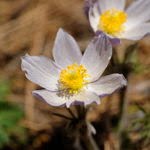The pasqueflower symbolizes all that is missing in the wintry landscape, and should there come a spring without the regeneration it prefigures, the winter would have grown lethal. Wildness without its flora would be only the bleak and conquering storm, and it is this florescence that the pasqueflower helps us to celebrate because it dares to bloom when the winter of which we have wearied is not yet gone.
As I weary of many tired arguments about how to manage protected areas (e.g., carrying capacity), the connections with society and the people who visit them, I always look forward to new ideas and approaches, such as the application of systems thinking to many of the challenges that confront us.
The pasque flower (and its equivalents around the globe) is important to me, and to all of us because it provides us with a sense of hope and celebration that Rolston spoke of. Providing stewardship for protected areas is difficult, and we need people and ideas who dare to bloom in a wintry landscape of gray.
Rolston is not the only philosopher to speak of the pasque flower. Naturalist and philosopher Aldo Leopold summed things up well when he stated:
“A chance to find one (pasque flower) is a right as inalienable as free speech.”




Steve,
ReplyDeleteChristopher Preston has a new Biography of Rolston out, which I read over the holidays. It's a great read and includes a bit about Rolstons' affinity for the pasqueflower. I highly recommend it.
Thanks Adam, I will take a look at the book.
ReplyDelete